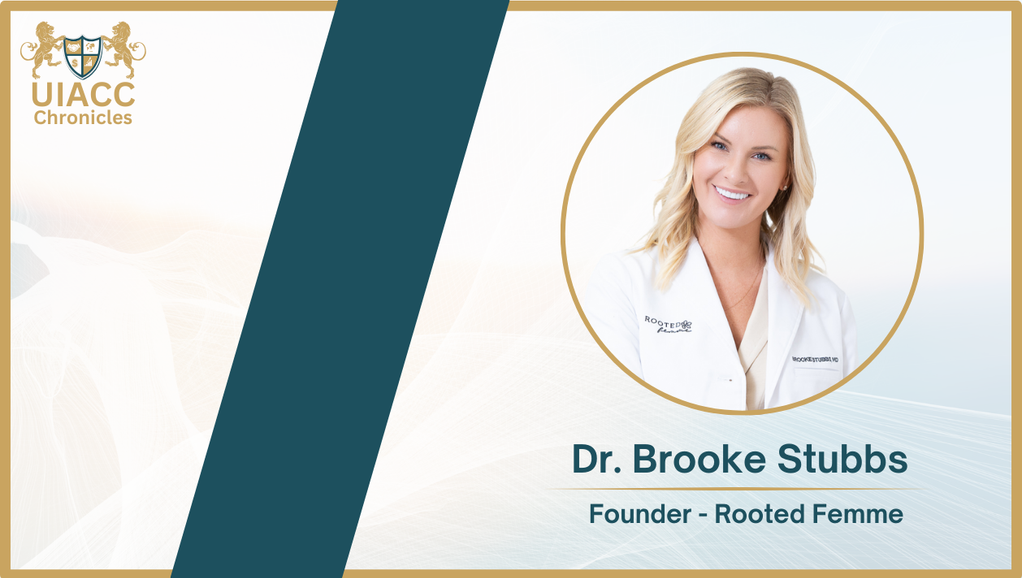Q: What inspired you to specialize in lifestyle medicine and establish Rooted Femme?
Dr. Brooke Stubbs: During my residency, I experienced burnout and health challenges, including chest pain and infertility issues related to endometriosis. Observing colleagues facing severe health crises made me realize the importance of preventive care. This led me to specialize in lifestyle medicine and establish Rooted Femme, aiming to educate and support women in optimizing their wellness through sustainable lifestyle changes.
Q: How do you integrate the six pillars of lifestyle medicine into patient care at Rooted Femme?
Dr. Brooke Stubbs: At Rooted Femme, we incorporate the six pillars by developing personalized plans that promote whole-food, plant-predominant diets, encourage regular physical activity, emphasize the importance of restorative sleep, teach stress management techniques, advise against risky substances, and foster positive social connections. This holistic approach addresses the root causes of health issues rather than just treating symptoms.
Q: Can you share a success story where lifestyle medicine significantly improved a patient’s health?
Dr. Brooke Stubbs: “One patient struggled with hypertension and obesity. By adopting a plant-predominant diet, engaging in regular exercise, and practicing stress management, she lost significant weight, normalized her blood pressure, and reduced her reliance on medications. This transformation highlights the power of lifestyle changes in managing and preventing chronic diseases.
Q: What challenges do patients commonly face when transitioning to a plant-predominant diet, and how do you help them overcome these obstacles?
Dr. Brooke Stubbs: Common challenges include misconceptions about nutrient deficiencies, resistance to change, and lack of knowledge about plant-based cooking. We address these by providing education on balanced nutrition, offering cooking classes, and creating supportive communities to encourage and sustain these lifestyle changes.
Q: How has your background in nutrition and internal medicine influenced your approach to patient care?
Dr. Brooke Stubbs: My training in internal medicine provided a comprehensive understanding of disease processes, while my nutrition background emphasized the role of diet in health. This combination allows me to address both the prevention and management of diseases through evidence-based lifestyle interventions.
Q: What role does stress management play in overall health, and what strategies do you recommend to your patients?
Dr. Brooke Stubbs: Chronic stress contributes to inflammation and various health issues. I recommend mindfulness practices, such as meditation and yoga, regular physical activity, adequate sleep, and fostering social connections to effectively manage stress and improve overall health.
Q: Can you discuss the impact of restorative sleep on health and any tips for achieving better sleep quality?
Dr. Brooke Stubbs: Restorative sleep is crucial for cognitive function, immune support, and metabolic health. To improve sleep quality, I advise maintaining a consistent sleep schedule, creating a restful environment, limiting exposure to screens before bedtime, and avoiding caffeine or heavy meals in the evening.
Q: What motivated you to start the podcast ‘That Rooted Feeling,’ and what topics do you cover?
Dr. Brooke Stubbs: I started ‘That Rooted Feeling’ to reach a broader audience and share insights on adopting a plant-based lifestyle, the science behind lifestyle medicine, and practical tips for holistic health. We cover topics like nutrition, stress management, and personal development to empower listeners in their wellness journeys.
Q: How do you envision the future of lifestyle medicine in the broader healthcare system?
Dr. Brooke Stubbs: I envision lifestyle medicine becoming integral to healthcare, with a focus on prevention and addressing root causes of diseases. This shift would involve interdisciplinary collaboration, policy changes to support healthy living environments, and increased education for both healthcare providers and patients on the benefits of lifestyle interventions.
Q: What advice do you have for individuals looking to make sustainable lifestyle changes but feeling overwhelmed by where to start?
Dr. Brooke Stubbs: Start small and set achievable goals. Incorporate more whole plant foods into your diet, engage in regular physical activity you enjoy, prioritize sleep, and practice stress-reducing techniques. Seek support from healthcare professionals and communities, and remember that consistency is key to sustainable change.





